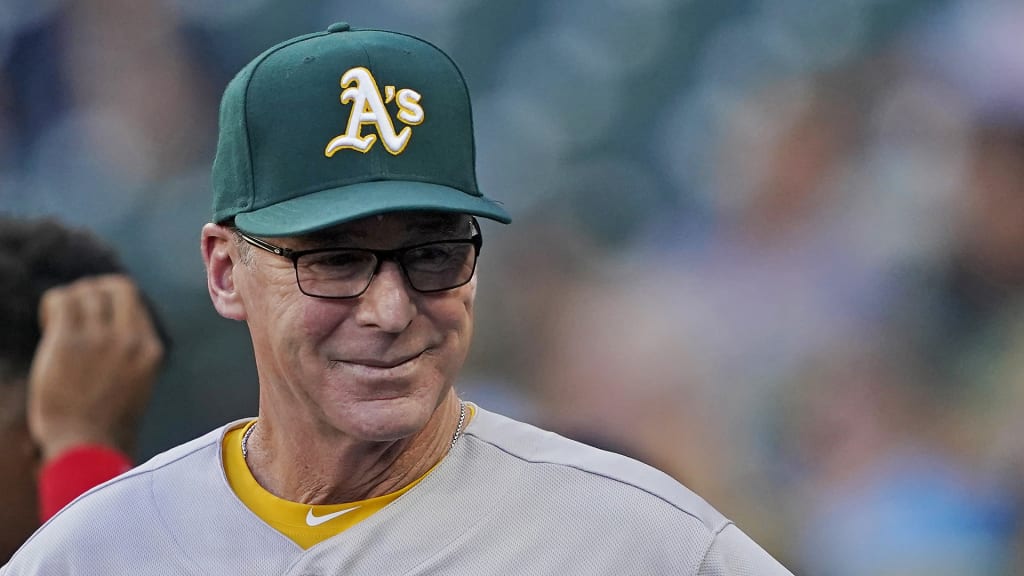
OAKLAND -- Adam Rosales had a premonition. The vibe as he sat on the black leather chair inside Bob Melvin’s office was all too familiar to the previous three times he’d been sent down to the Minor Leagues. Sure enough, the A’s skipper delivered the dreaded news. For the fourth time in the span of 10 months, Rosales was being optioned to Triple-A Sacramento.
Known for his scrappy and energetic play on the field, Rosales is reserved off it. He was never one to speak out in protest. But this time, he felt like he had to say something.
Rosales nervously tapped his fingers along his hips as he waited for Melvin to finish explaining the logistics of the move. He stood up once the discussion was over, still contemplating whether he should voice his opinion. Heading towards the door to the A’s clubhouse inside the Coliseum, Rosales decided to venture out of his comfort zone. He stopped just before grabbing the door handle and turned back around to face Melvin.
“BoMel,” Rosales said, referring to Melvin using his oft-used nickname. “I wish you guys had more confidence in me.”
Without hesitating, Melvin countered: “Rosey, before we can have more confidence in you, you gotta have more confidence in yourself.”
Rosales was stunned. This wasn’t the normal coach speak he was anticipating. The typical cliches that managers will often throw out to deflect the heat. Instead, Melvin, who wasn’t even a full season into his tenure as Oakland’s manager, had kept it real.
“He really shot me straight,” Rosales said, recalling that interaction that took place June 16, 2012. “That opened my eyes. I feel like most managers would have been like, ‘Hey, it’s not my decision.’ But he truly cared about me enough to tell me how it really was and what he really saw. Just had that mutual respect. That stood out to me.”
Wednesday marked the 10-year anniversary of Melvin taking over as manager of the A’s. Replacing Bob Geren at the time, the task was unenviable -- guide a club that hadn’t reached the postseason in a half-decade out of obscurity. Six playoff appearances, two Manager of the Year Awards and over 800 wins later, Melvin is enjoying a run as the longest-tenured active manager in the game.
Last week, Melvin -- who as a 10-year-old kid from Menlo Park sat 15 rows behind the Coliseum’s visiting dugout for Game 3 of the 1972 World Series to cheer the A’s to victory against the Reds -- surpassed Hall of Famer Tony La Russa’s record for most wins all time by a manager in Oakland history. Legendary Connie Mack, who guided the Philadelphia Athletics from 1901-1950, holds the franchise record for wins (3,582).
This impressive longevity has been cultivated by relationships Melvin has formed with his players. Instances where Melvin has opened a player’s eyes with his blunt honesty, like that exchange with Rosales in 2012, have been a trademark of his managerial style. Even with heavy player turnover, Melvin’s transparency has resonated with each group that has come through Oakland. His understated approach to managing has also served as a buoy inside the A’s clubhouse.
Melvin's exceptional communication skills extend to his interactions with the A's front office as well. From executive vice president of baseball operations Billy Beane down to general manager David Forst and assistant GMs Billy Owens and Dan Feinstein, Melvin is united with the group to form a partnership that remains in constant dialogue regarding roster decisions.
"Bob is an absolute treasure," Owens said. "He has this unique ability to make you feel important, regardless of your stature in the room. His relationship with everyone in the front office is seamless. He listens and considers every piece of information while being able to decipher, analyze and come to a conclusion. He’s not going to always agree, but he’ll consider all of the votes.
“When we first hired Bob, my phone blew up with players he had before being effusive in their praise. They couldn’t say enough good things. After experiencing him first-hand, I can echo how awesome he truly is.”
One of the rare times during the Melvin Era in which an internal conflict reached the public came in 2015. Josh Reddick, an emerging star on the A’s clubs that reached the postseason each year from 2012-14, was upset with his limited playing time against left-handed pitchers and voiced his displeasure in an interview with a local Bay Area radio station. After talking it out with Melvin one day later, the two were back on the same page.
“Bob was one of the better people to handle that for me,” Reddick said. “He was a great mediator to voice my opinion. That was pretty fantastic of how he handled that for me, on a personal level.”
Melvin’s ability to quell similar quandaries remains a quality that sticks out with this current group of A’s.
Chad Pinder, a second-round pick by Oakland in the 2013 Draft, breezed through the A’s Minor League system playing on an everyday basis at either second base or shortstop. But since his arrival to the Majors in 2016, he’s become a utility man who has played seven positions, with most of his starts coming on days that the club is facing a tough lefty starter.
Pinder would be justified in advocating for a steady everyday job at one position. It’s all he’d done in his professional career prior to getting called up. However, he receives a clear understanding of how he can make an impact, even in an unorthodox situation in terms of playing time, from Melvin’s upfront and clear communication before each season.
“With a lot of uncertainty with my role, he tells me as it is and how it’s going to be. What I’ve got to do,” Pinder said. “That’s all you can ask for out of a manager -- not to be held in the dark about things. He’s very honest about what I have to do. Very open and transparent. That’s something I really respect about him and am grateful for.”
Players like Pinder, Matt Chapman and Matt Olson have played under only Melvin so far in their big league career, but they realize how rare it is to have always had manager of Melvin’s caliber.
“Talking to other guys who have played for BoMel and gone to other teams, you just see and understand how good of a manager he is and how lucky all of us are,” Chapman said. “He was never too hard on us when we were young. He gave us the opportunity to continue to work and grow. He was patient with us in 2017, when a lot of us young guys came up. I think he’s always believed in us.
“I owe a lot of the success that I’ve had to BoMel for giving me the opportunity and believing. He shows up every day and is always there for the guys. He treats everybody the same, whether it’s a young guy or a vet.”
Shortstop Marcus Semien played under Melvin for six seasons before joining the Blue Jays as a free agent this offseason. Before his first game back in Oakland last month, Semien called Melvin “a father figure” and “the best manager in the game.”
Mitch Moreland had heard the rave reviews about Melvin from afar. He knew a little bit about the manager from head-to-head American League West battles over the last decade while a member of the Rangers. Once he signed with the A’s in February and arrived in Mesa, Ariz., for Spring Training, he quickly understood why Melvin had received such heavy praise. It was warranted.
“I got the same vibe from the guys when I got here in spring. He’s good, man,” Moreland said. “He makes all the right calls and the right moves. He communicates well with the guys and keeps it light and fun. It just seems like he’s always a step ahead. Just playing against him, that’s what I saw all those years. Being able to play under him has been a treat and a privilege.”
There’s more to Melvin’s success than just being honest and understated, though. He’s also a brilliant in-game strategist. How else could you explain the A’s ability to consistently compete with and often overcome AL West juggernauts? Whether it was the powerhouse Rangers clubs of the early 2010s or the star-studded Astros teams in the past few years, Melvin takes his group of lesser-known players and finds a way to even the playing field.
“I think he’s a wizard,” Reddick said. “He crafts all kinds of crazy lineups and finds different ways to win with different players that may not be the biggest superstars in baseball. That’s how it’s been for probably the last nine years in that organization.
“He’s handled it perfectly and has years of experience from being a bench coach and manager in different organizations. He knows how to impact every part of the game in any given moment. He does the perfect job for those guys over there.”
Going through his 18th season as a manager in an illustrious career that features nearly 1,300 wins and three Manager of the Year Awards -- his first came in 2007 as manager of the D-backs -- the only box left for Melvin to check off is a World Series title. That’s a big motivating factor for these current A’s, who are positioned well for another postseason appearance as they currently sit atop the AL West standings in first place.
Regardless of how many titles or wins he finishes with, though, Melvin has clearly left a lasting impact on his players. Don’t be surprised if you see some of the A’s of the last decade become managers one day and employ some of Melvin’s managerial qualities. There’s already one in the A’s organization with Rosales, who just this year was named manager of the Arizona A’s in the Arizona Rookie League.
“The couple of things I take from him is how you treat your players with that respect and transparency,” Rosales said. “You think like an airplane pilot or captain of the ship. If there’s any kind of panic or emotion that is hard to read, it’s going to be confusing. He’s even-keeled. He’s level-headed, because he slows the game down for himself and for the entire team.
“He reached out to every individual on the team and truly wanted to have a cohesive unit. He wanted to bring that culture in. That transparency. That open-door policy. That communication is everything.”


